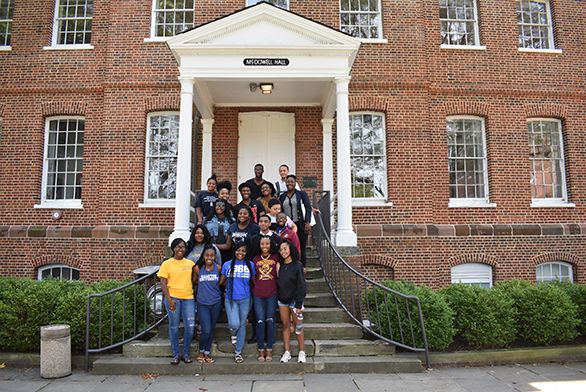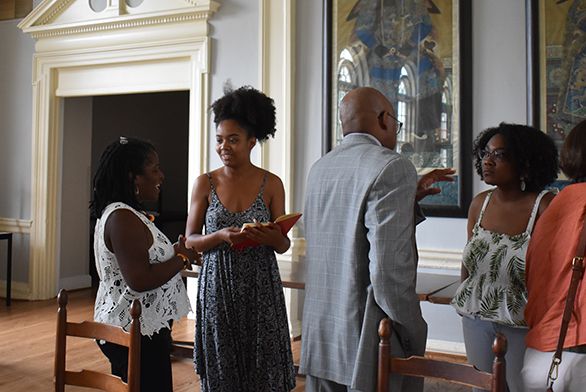St. John’s Partners with United Negro College Fund and American Enterprise Institute on Summer Program
October 2, 2019 | By Kimberly Uslin

Weeks before students flooded back to campus for the Fall 2019 semester, a group of scholars gathered around St. John’s seminar tables, puzzling through some of the most influential texts in history. The students were participants in “What to the African American Is Freedom? A Historical Perspective,” a new pilot program co-created by the United Negro College Fund (UNCF), the American Enterprise Institute (AEI), and St. John’s College.
From July 28 to August 3, 20 African American and black students, primarily from Historically Black Colleges and Universities (HBCUs), convened on the Annapolis campus for a weeklong program of reading, discussion, lectures, and field trips.
“The AEI and UNCF were teaming up to offer a summer Great Books seminar, and St. John’s was the natural choice because of our seminar format,” says Annapolis campus President Pano Kanelos. “Brent Orrell, who is working at AEI as a researcher, visited campus to research a book he’s writing about St. John’s and thought it would be a great connection.”
Kanelos met with the administrative boards of UNCF and AEI, then with a group of African American scholars at Harvard—led by Melvin Rogers—who shaped the curriculum and reading list for the week.
“We’re a community that thinks about books that are great across a very broad spectrum,” says Kanelos. “We’re always trying to expand our horizons and move in directions that we haven’t moved in intentionally before. When students and faculty read these texts on campus, it has a rebounding effect on the way we read.”
“The Program is not just the fixed reading list,” he continues, “but the intellectual life of the college, all these paracurricular activities that are contemporary, exciting, and inclusive.”
While the UNCF/AEI program shared some readings with the St. John’s Program (notably works by Frederick Douglas and W. E. B. Du Bois), many of the authors and texts on the week’s syllabus were new to St. John’s. For the four Johnnies participating in the program, this was particularly exciting.
“It was almost too perfect,” says Zion Peart (A21), who had long been interested in studying African American political thought. “When I decided to go to St. John’s, it was really so that I could learn and gain better tools to then go back and approach those questions and those problems. So it was really awesome to have that synthesis of the St. John’s method towards the issues and questions that had been on my mind for a very long time. It was just so exciting to see this perfect marriage of two of my interests.”
For Peart, applying the St. John’s method of discourse was particularly important when those around the table were those directly impacted by the questions put forth by the reading.
“The nature of the texts and the questions being examined are significant for so many people,” he says. “And to have the scholastic setting and the discourse around these texts—to have the voices of the people being affected by these questions have a conversation with these authors and texts—is for me a very, very efficient synthesis.”
Classroom discussions were broken up into two parts: larger discussions with the whole group, followed by breakout sessions with small groups of six to seven students and two faculty members. Each day of the program had a theme, from “Abolition & Revolution” and “Freedom & Justice” to “Self-Help” and “Political Economy,” and students read works from the early 19th century through the 1980s. Authors included Hosea Easton, Ida B. Wells, Anna Julia Cooper, Zora Neale Hurston, Marcus Garvey, Malcolm X, Martin Luther King Jr., Audre Lorde, and others.
“There is no monolithic African American history,” says Lisa Hill, one of the scholars who helped shape the curriculum. A specialist in Civil Rights and African American women from the 17th century to the present, Hill was one of the program’s faculty members and led both the whole-group and smaller discussions. “We were looking at the complexities of the voices—in what space does this person write, and what is the historical background?”
Two St. John’s tutors were on the faculty, too: Zena Hitz and Brendan Boyle.
“The students were incredible—very smart, very lively,” says Hitz. “It was a privilege for someone like me to be in a group of all African American students, talking about what is in a special way their history, but also my history as an American. That was an exceptional experience.”

After their class sessions, the students would meet for lunch, where they heard from speakers—St. John’s alumni Anika Prather and Robert George, economist Glenn Loury, and representatives from the Graduate Program and AEI. In the afternoons and evenings, they took trips: a guided tour of Annapolis, an afternoon in DC to tour the National Museum of African American History and Culture and visit the AEI headquarters (and listen to a talk from AEI President-elect Robert Doar), a tour of the Banneker-Douglass Museum, and dinner and a manumission tour of Alexandria.
The speakers represented a wide array of viewpoints, and the diverse perspectives provided participants in the program an opportunity to practice a hallmark of the St. John’s education: civil dialogue.
“They asked good, but hard questions,” said tutor Brendan Boyle of the students’ reactions to the speakers. “That, for me, was one of the most successful parts of the week—watching the students try to understand convictions they did not share, but which, all the same, were rooted in the very texts they had been reading.”
“I’m not extremely political as a person,” adds Peart. “However, leaving this program and then experiencing all of that, I realized there is kind of a responsibility as an individual—not to become a politician, but to be involved or at least aware of politics. It definitely just changed the nature of my thinking drastically. I’m very grateful for that.”
Johnnie participant Rae-Ann Clement (A20) agreed. She did not always hold the same views as her peers—something she attributes to being a citizen of Trinidad and Tobago rather than an African American—but appreciated the discussions.
“Opening our minds to another perspective is, to me, part of what we do at St. John’s,” says Clement. “It was intense, but in a good way, an engaging way, an enlightening way.”
The program provided an exciting opportunity, too, for increased collaboration between the UNCF, AEI, and St. John’s. In the weeks following the program, for example, Peart has attended a UNCF summit as a volunteer, secured an internship with AEI, and talked with Hill about the possibility of assisting her with research.
Overall, members of the St. John’s College community who participated in the program hope the momentum from the week can continue, from reading more works by Frederick Douglass, Martin Luther King Jr., and other African Americans to an increased understanding of the legacy of slavery on the St. John’s campus.
“We don’t really focus on the background of the authors [in the Program],” says Clement. “At the end of the day, we’re reading what they wrote. We don’t think about whether they’re black or white or their political status. But it is important, because it’s going to be a different type of thought that we read if we’re reading people of different races, ages, political backgrounds, and things like that—and to leave off an entire race of people limits us. Programs like this open discussions about introducing things into the Program.”
“A lot of times, white people or people who aren’t black don’t have to think about these things, so they don’t,” she continues. “People don’t like to talk about slavery because it’s so ugly, but you have to get people thinking about these things. And at a program like St. John’s, we push for open-mindedness and seeking knowledge.”
Boyle agrees, noting that it’s important for those outside of St. John’s to see that the Great Books on the curriculum are by no means the only texts the college considers great.
“I think that one of the greatest successes of the week was talking to students about the college and showing them that we don’t think of ourselves as having the single list of Great Books. We’re doing good for the college to show itself to be a place that is committed to this kind of inquiry, and to show that we don’t think that there is just a list of great books and that list is closed and finished.”
“We have a list, and it’s got a lot of great books on it—all of the books that are on it, in fact, are great—but that list is not exhaustive,” he continues. “It’s the subject of all kinds of historical contingencies and is subject to revision and change and contestations. It takes work and conversation for people to see that, and I love that this week, there was a really great opportunity to do that.”

